Artist Interviews 2023
Julia S. Powell 
By Julia Siedenburg
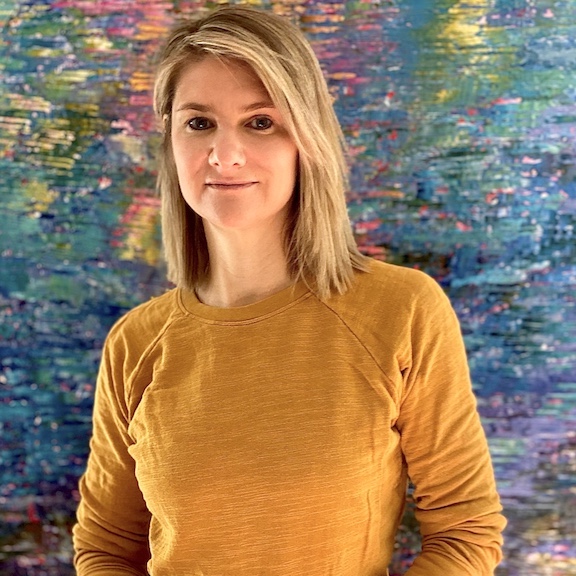
Julia S. Powell creates beautiful dream-like landscapes and overall nature-focused paintings with the intention to give the viewer a little moment of calmness and peace in this world full of chaos and darkness. And she absolutely succeeds in it!
Her idyllic vibrant works of art radiate the love and the joy she created them with. She is able to so effortlessly capture these beautiful moments in time, and all by drawing from her memory of a picture she once saw or a place she has been to.
This single mother powerhouse supports herself and her little one solely from the sales of her work. She is a true inspiration showcasing how you can have it all: Family time and a successful career. And if that would not impressive enough, in the little spare time she has, she also focuses on supporting important causes and giving back.
I am in awe of her talent, strength, and dedication, and I am so grateful that she gifted us a moment of her time and shared her thoughts on her craft. I hope that you will enjoy learning about this amazing artist as much as I did, dear reader! Get ready to emerge in a wonderful world!
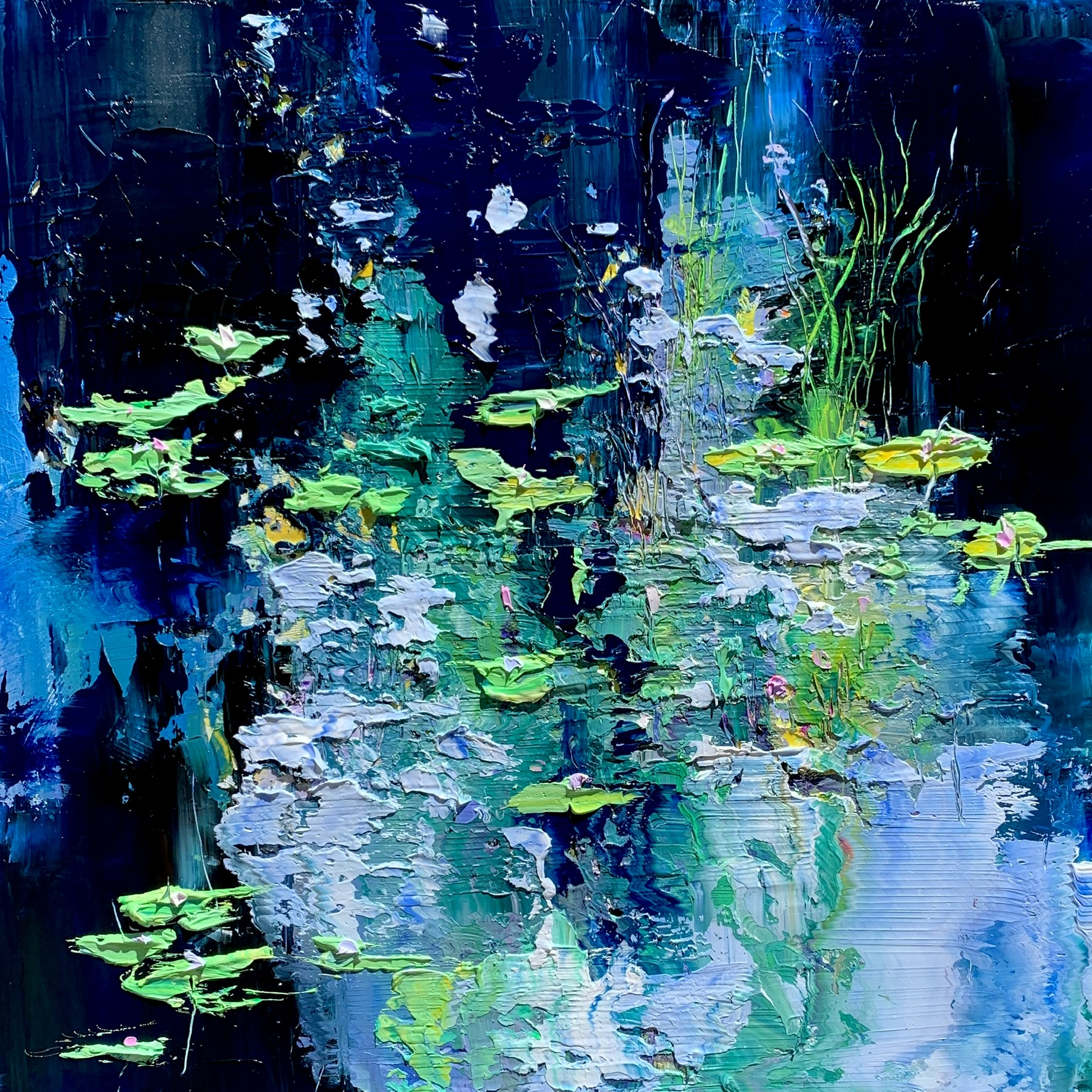
When I first came across your beautiful, vibrant, nature-focused work, I couldn't help but notice how light and happy it made me feel. What are you hoping people experience when they see your art?
The predominant feeling I want people to have when they look at my art is joy. I feel like art has so many purposes, and some of those purposes are to highlight injustices in the world and really make you think. And for me, when I started painting, there was a lot of, I thought, dark forces in the world. And I think Donald Trump was about to be President, and he's not my favorite person. And so I intentionally was creating a lot of work that was meant to settle the brain and give people a place of calm and peace and joy. And I really think of my art as a mental health break. And mental health is something that I'm very interested in as a way of easing anxiety and depression. That is what the purpose of my work is. And I respect every art for what it's doing. But sometimes I feel like there's a bit of, not looking down on, but peaceful, beautiful landscape art is not taken as seriously as dark identity-focused art. I think they're all really important for what they're trying to do for the human heart and the human brain.
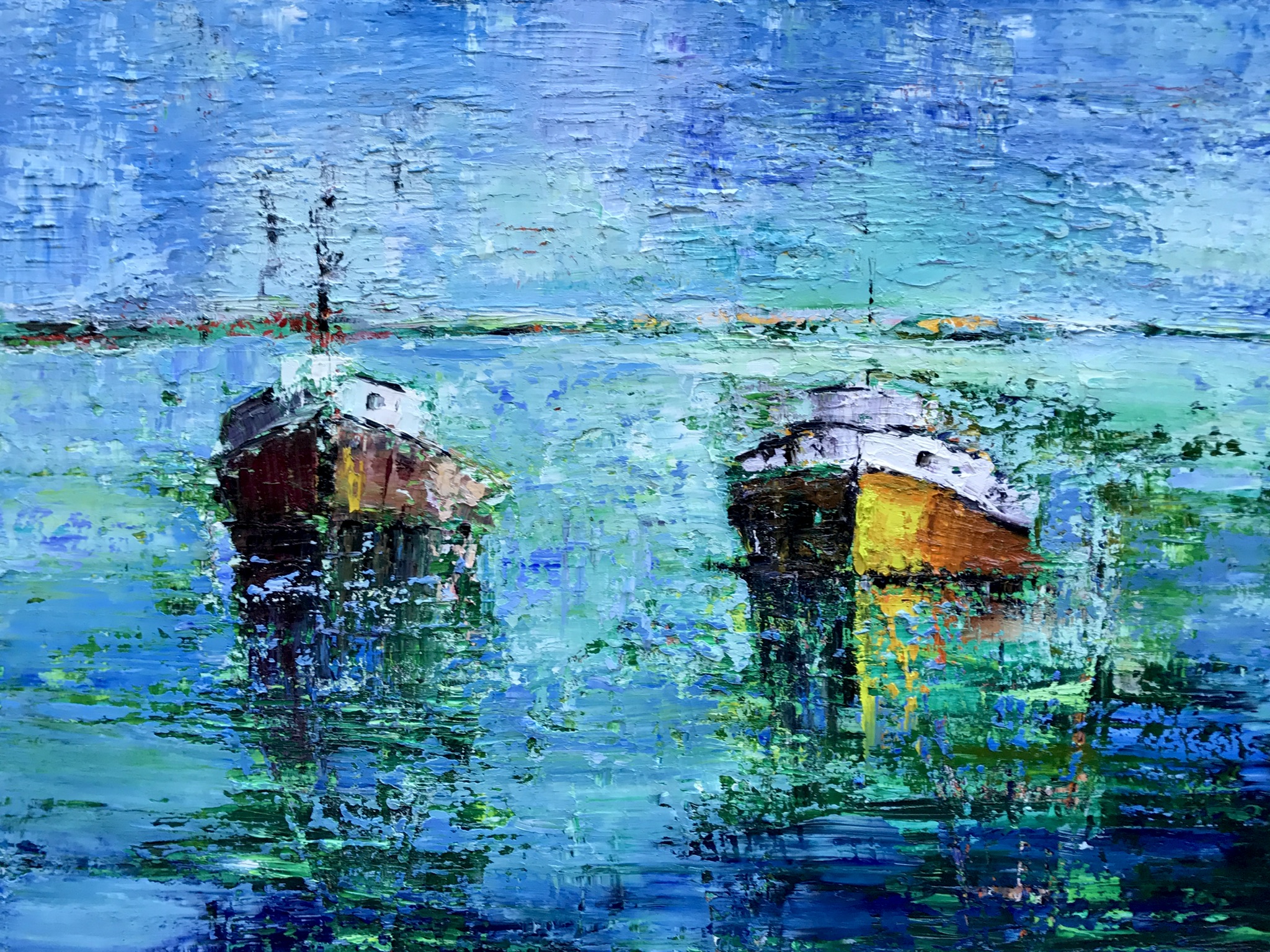
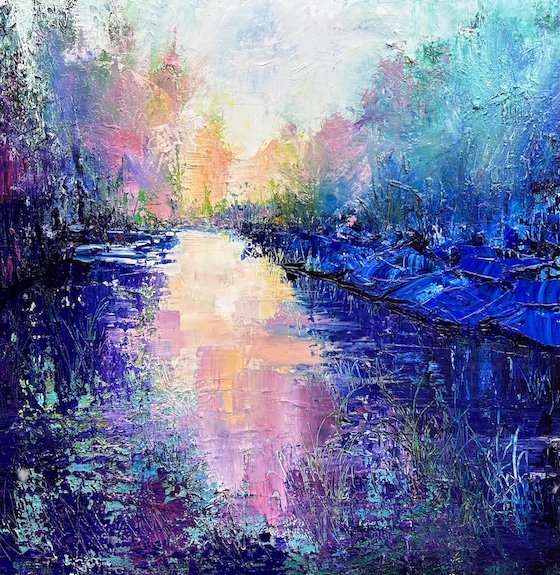
Do you personally need to be in a specific state of mind or emotion to create?
No, not at all. I was an attorney before switching over to art, which I know you know, and have been a full-time artist for nearly a decade now. So I'm very much in that practice. But my personality is pretty intense and I feel like there's this sense that the I don't know, you have to be moved in order to work as a creative type. The spirit has to move you. And that's just not how I think successful creative types get through funks. So basically every single day I'm in my studio unless I have no childcare. And I just sit my butt down. And there are many days when I'm grumpy. There are many days when I'm mad, there are many days when I'm tired. There are many days when I'm sad. I'm a very deep-feeling person, and my emotions can really range. It's a run the gamut. And so I paint because it makes me happy, the actual process of painting. And then I paint in order to create things that continue that joy and calm creation. But I definitely start painting when I don't want to, but almost always I'm happy and doing it.
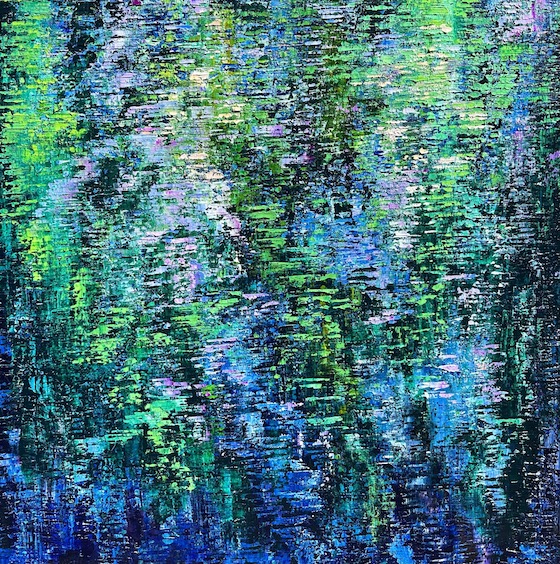
In your artist statement, you mentioned that your work is inspired by the renowned American poets Robert Frost and Mary Oliver. Can you explain to our readers who they are and why you feel so connected to them?
Yeah. So Frost was a poet who was primarily, I mean, it was early 20th century, and Oliver is much more contemporary. She just actually recently passed away. And they were two poets that were seen, each in their time, as very accessible in that they wrote poetry that had a very broad appeal. And because of that, there were times when they were judged by their contemporaries as not being as serious as artists because they were writing the actual verse that they were writing. And Oliver, in particular, this happened to her a lot, I also think, because she was a woman. But we're like serious critics who didn't really take them seriously, but they had tremendous popular appeal. And I certainly feel like that sometimes for me, where I have a very popular appeal and I have a big Instagram account and a lot of... But sometimes I feel like I'm not taken seriously by critics because of the particular other things that I'm trying to do. I don't shy away from accessibility. I think it's great that my work is accessible. There are so many people who reach out to me and say, I don't know anything about art. I'm a stupid person when it comes to art, but I just really respond to your art. It's almost like they're embarrassed by that. I'm always like, Hey, art is art. If it's working for you, that's exactly what I'm trying to do. It doesn't matter if you don't think that the traditional gatekeepers, whatever. But that's part of it. And the other part is what they were specifically writing about, or what they focused on in large part was nature. Both of them would like to go out and be one with nature, take a lot of walks, take a lot of walks in the woods, and then try to capture that experience of what it's like to be very present. And part of this whole overarching theme of what I'm trying to accomplish was bringing joy and peace and calm. Part of that is just aligning your brain to the present. This is all modern, I would say, meditative wellness. A lot of it talks about being in the present. I think that's why people love nature so much you're really put there. You're not on your phone, you're not paying attention to somebody else.
You're just paying attention to the very specific things that are happening, like the crunch of the snow under your feet or the light through the trees. That’s what they were trying to write about. I think in large part for people to read it and then be transported to that place and then really soothe their brains. I really think that for us and all of us, we're trying to do what I'm trying to do as a painter.
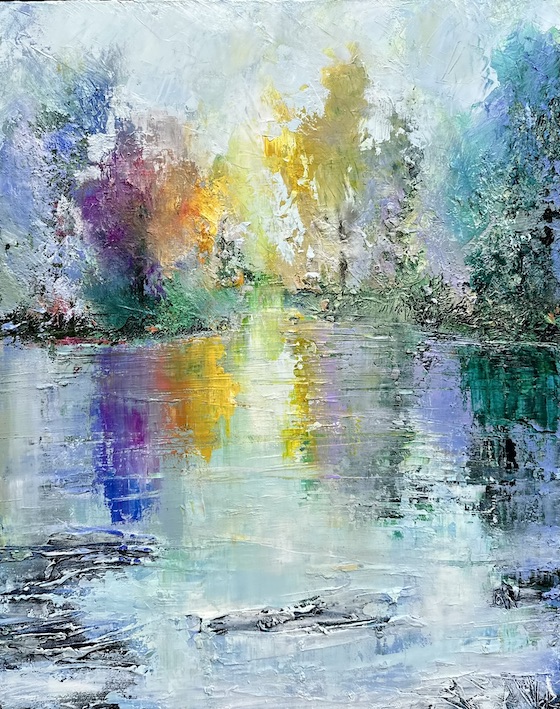
Who are your biggest influences in the painting world? Is there anyone that inspired you to draw the way you do?
My biggest influences are a lot of French impressionist painters and French dresser impressionist painters. I primarily think of myself as color and texture are the things that I really try to focus on.
So some great colorists, people who are just genius with color, I would say, Monet, Van Goh. These are also extraordinarily popular painters. Clint is another one. And then there's a guy named Wolf Khan who recently passed away, who painted in Vermont. He was an incredible painter, and also just an amazing colorist. And then a little bit of the abstract expressionist, so Helen Frankenthaler, particularly women who are coming up in that time. I think what they were painting is obviously very different from what I'm painting, but their use of color and their sense of being somewhat of an outsider, that's very inspirational to me. But yeah, in terms of contemporary painters, there are 10 to 20.
Painters that I follow on Instagram. And what's very weird about Instagram is sometimes their handle doesn't even say their name or whatever. But I could tell you what their work is. And it's men and women, and they're all contemporary landscape painters, which is they are pushing the boundary of the landscape. They are not trying to be realists and they're not fully abstract either. But I wouldn't even call them impressionist because that's such a specific art genre that's really grounded in the 19th century. But contemporary landscape painters were basically trying to evoke a sense of mood and memory more than realistically depict something. Any person who's trying to do that, who's really gifted is an influence on my work. But I guess I'm not specifically saying those names because they don't come to the tongue as easily as Monet.
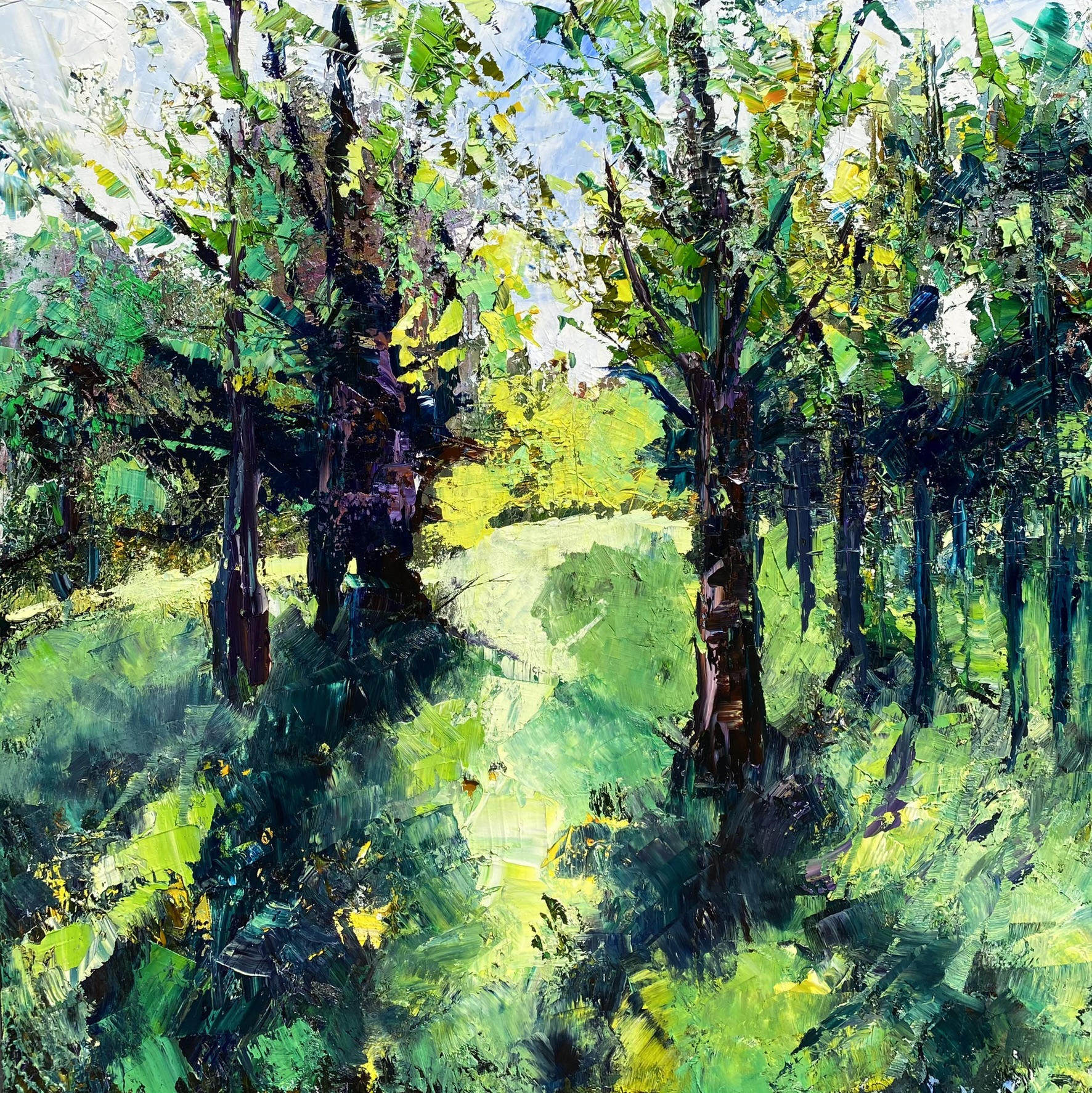
Your images remind me of trying to think back and visualize a place from my memory in my mind, remembering certain details, shapes, colors, and the feeling you had when you were there, though the image does not become 100 % sharp. Are your locations created from memory or through your imagination?
I love this question and I love that that's what that was doing for you. That's awesome. Thank you.
Yeah. Exactly what I'm trying to do as a painter is not paint from photographs, I paint from memories. Everything I paint, almost everything is not a specific place at a specific time. It's a place, maybe throughout the course of 10 years, and different light hits it. Or it's like five different places that are all put into one. And it's because memory is shifty and strange. Memory doesn't always exactly line up with what happened. And then it's like, well, what does it mean for something to happen anyway, since everyone's experience of something is so different? So absolutely, I am painting from memories in my mind, and I want it to be almost like a dream you had of a place as opposed to the actual place. That's what I'm aiming for.
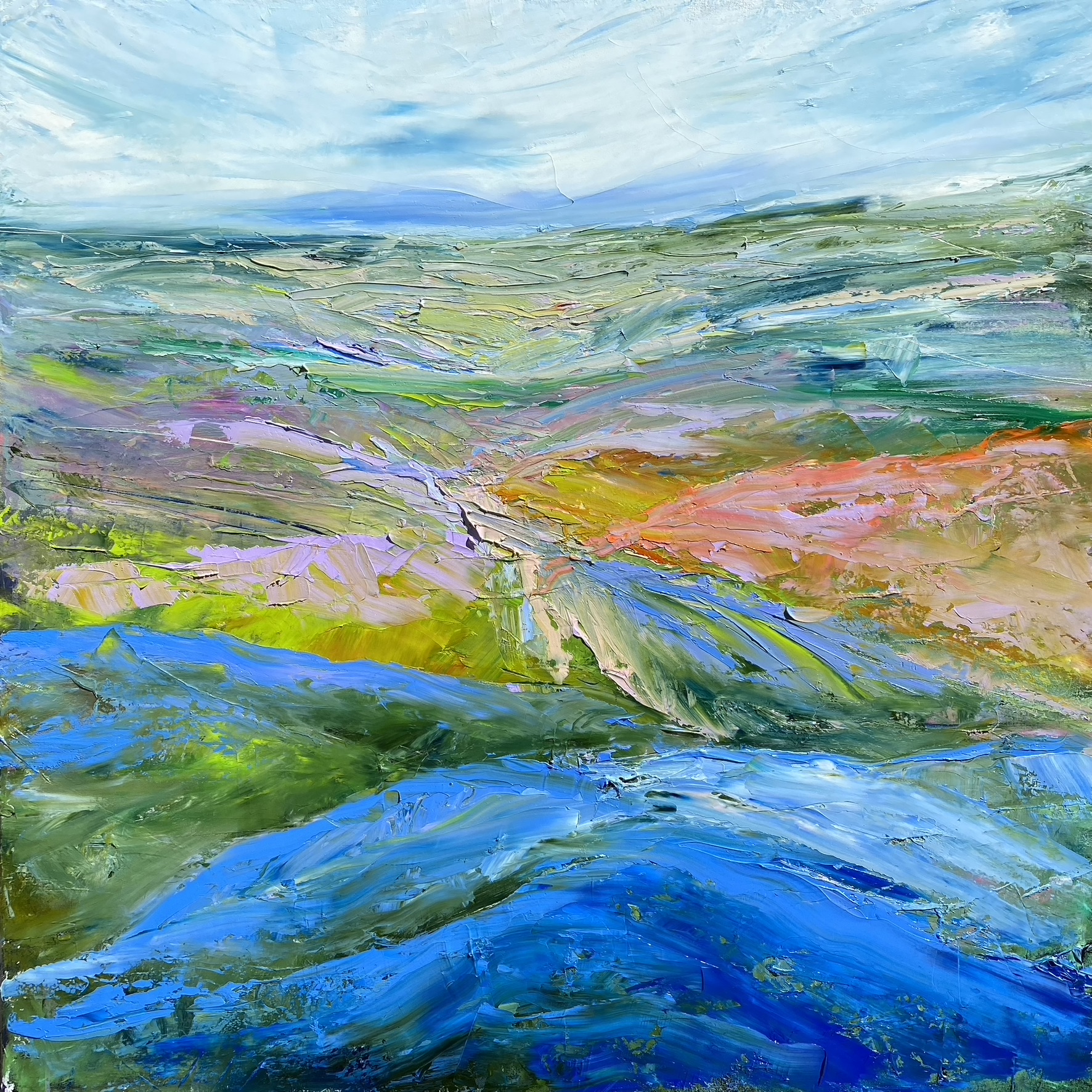
To clarify, you spent most of your time on the East Coast, right? So most of that stuff is majority United States, like East Coast inspired?
I have spent a lot of time in California in my life. I went to school there. And also I visit there a lot. And I've lived in lots of places. I lived in Argentina for a bit. I lived in New York and Washington, DC. I lived in rural Oregon. I lived in California, as I said, and now East Coast. So yes, a lot of it is main. I'm New England inspired, but a lot of it is like I will go to when I travel, which I used to do a lot before, but young children destroyed that.
I would take lots of photographs and really try to remember that experience of being there. Because while I don't look at photographs, I will, to clarify, I do look at photographs to remind me of the experience, and then I'll paint. The photographs are fresh in my mind. Does that make sense? I'm not actually looking at them while I'm painting. And there's been some commissions. I have a huge client base in California, and there's been some commissions of people who are based in LA or San Francisco, predominantly around there, who have sent me photographs of places that are meaningful to them. I look at the photographs and try to imagine being there, and then I put it away. My mind comes up with a visualization based on my memory of the photograph.
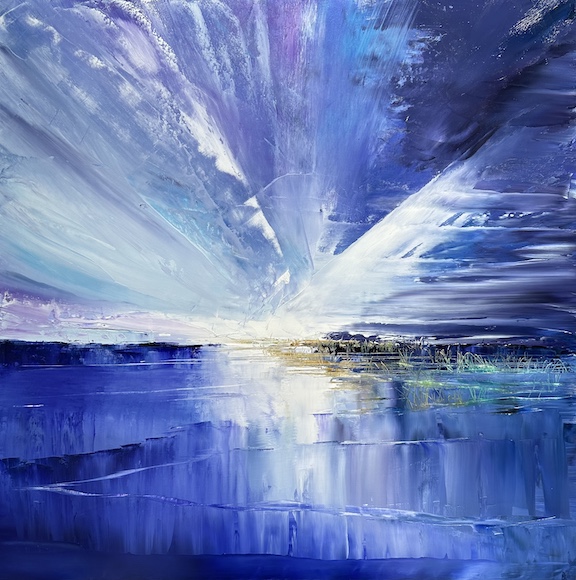
Thank you for clarifying that. Next question. Watercolor, oil, or printed using the glacier process, how long does it take from having the idea for the image to the finished product, and how do you choose your material?
My materials, I've worked for 10 years experimenting with different kinds of oil paint. I use water mixable oil paint because I'm a mess and my stuff gets everywhere and I get very into it when I'm taking and I don't like to use things like turpentine, which are very strong paint thinner s and they're very strong and they're needed to clean brushes if you do regular oil paint. So I use water-mixable oil paint, which is amazing. It's like these hybrids where I think it retains the incredible color complexity of oils while also being able to clean up easier. And also you can use water in interesting ways to thin it out if you want. I have used Holden. It's just a great company.
Watercolor, I've also just experimented. There is some Japanese metallic that is really cool. I think the key thing is to experiment. I used to look at artists and they would recommend brands and I would buy them because I love those brands because I love the artist. And then I didn't really like it as much. And so My biggest advice for people starting out is to experiment with 20 different things and also pay a little bit extra for artist grades because student grade stuff is mostly crap.
You'll get frustrated pretty easily. Then what was your other... My prints are really like I take a high-quality photograph of a print. That’s what... And then I just make sure that it's as close to the image as possible. Then I have to upload it to a site, and that doesn't take more than 20 minutes. It's not a big deal. An oil painting can take me anywhere from 6 hours to 6 months. It's not like I'm working nonstop on the six months, but because of the textures and the drying time, it's hundreds of hours and months of time for my large abstract water reflection series. That's great. t there’s a huge commitment there. But it's so variable because I paint as small as 6 by 8 inches and as large as 60 by 72 inches, which is 5 feet by 6 feet. So that is just such a massive range that it's always going to be a massive range in terms of time. The nature of watercolor is you have to go from start to get finish. So I don't know, two to five hours. Again, it's very different from oil.
I will say that it's funny because a lot of painters bristle at the question of how long did that take you? Because it's like, Well, are you asking how long did it take to hone my craft? That was 20 years, then 10 years. But are you asking how long did it take to come up with the kinds of composition? Because I think there's something interesting in terms of how people correlate the finished product with how much time it took. So if you say it took an hour, you say it took 10 hours. People have a different ideas of the piece, even if it's the same piece.
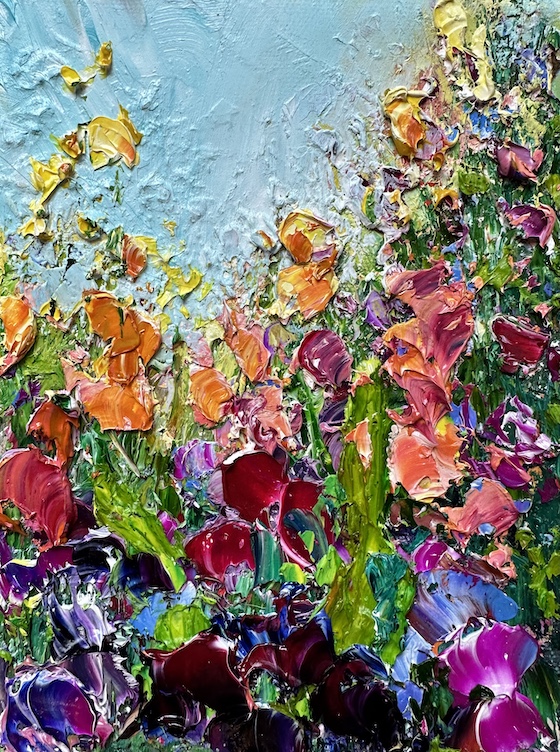
You have an impressive resume: Attend Yale as an undergrad before obtaining a law degree from Stanford. Now a full-time mother whose work has hung in different galleries, been used in TV shows and showcased in magazines like Marie Claire and Architectural Digest. How do you do it all? Do you feel like your background in law and being a mother influences what you create?
Great question, too. I feel like almost every working mom I know, whether I'm single, I'm a single mom, too, so that's even crazier. But I feel like basically every mom I know of children under five is just maxed out all the time. You sign up for that and it's fine and kids are great if you want them. And it's just like you get on with it. I will say being a lawyer has helped me immeasurably with the business side of my art. So often people just focus on the art side and there are all these incredibly talented painters out there who don't know how to market themselves. They don't know how to set up a website. They don't know how to figure out the distribution channels for getting their work just in front of as many eyeballs as possible. And I think I have that analytical brain. And as I mentioned earlier, I also work very hard, even when I don't feel like it, because you have to be incredibly self-motivated if you don't have someone breathing down your neck. If you don't have a boss or a deadline, I think sometimes some people would find that difficult.
But I'm very self-motivated so that lack of structure doesn't hurt me because of my personality. I don't think that being a mother or a lawyer influences the things I create. To be honest, I think they're just totally separate things. I haven't seen my work evolve that much since having children. I think my work is getting better as I hope any artist wants their work to be getting better. I will say that I have no free time. I'm always doing something fairly productive with my time. That actually really helps my mental health. It's funny, when I was in my late 20s, and early 30s, I had much more free time, and I just figured it away. I was doing the crossword for a while. I was not focused, and that made me sometimes feel really shitty at the end of the day. Now I think it's even harder because you can just go down one hole on Instagram and then two hours later merge with your 29. Do you know what I mean? And you're like, What did I just do? And usually, you feel worse about yourself because the algorithm has pointed you down so many paths that make you compare yourself to people who you think are better even though they're just showing off their best selves.
And all of that stuff I don't do anymore because I have to be so focused. When I'm working, I have to work because it means I'm away from my kids and I don't like that. So I actually think being a mom can really... If you can figure it out and if you're lucky enough to be flexible, it actually really focuses you and you can really enjoy your kids and try to be present for them. And when you're not there, you don't fuck around.
And I also think, in particular, I am the breadwinner. I have no financial support from anyone. And I live a very in a super expensive place, and I am used to certain things that I've gotten myself into, like a mortgage on a house when I was a lawyer. And so when I transitioned over to art, I was aware that I had to actually earn a good living, not even just a livable, but a good living. And I think that that's a really interesting thing that happens with women and female artists so often because they're not the breadwinner in their families. They're an amazing artist, right? Let's say their husband does X, Y, and Z. They don't make time for it because it's seen as not as important or this or that. And then guess what? They don't sell as much. I think because I'm the breadwinner and I need to do this in order to literally pay monthly payments and my kid's nursery school and I have an au pair because I couldn't do this if I didn't have someone who lived with me to help me out.
I don't know all of these things I have to think about, and they're all calculations, but I think everything is harder if you're a woman. It just is. Simultaneously, your art is not taken as seriously if you're a woman. You don't sell it at a high price point unless you fight for that, which I do. Just so much is asked of you. Anyway, I appreciate that so much. But in a weird way, it's a gift, I think, that I have to hustle because it makes me incredibly focused on what I'm doing.
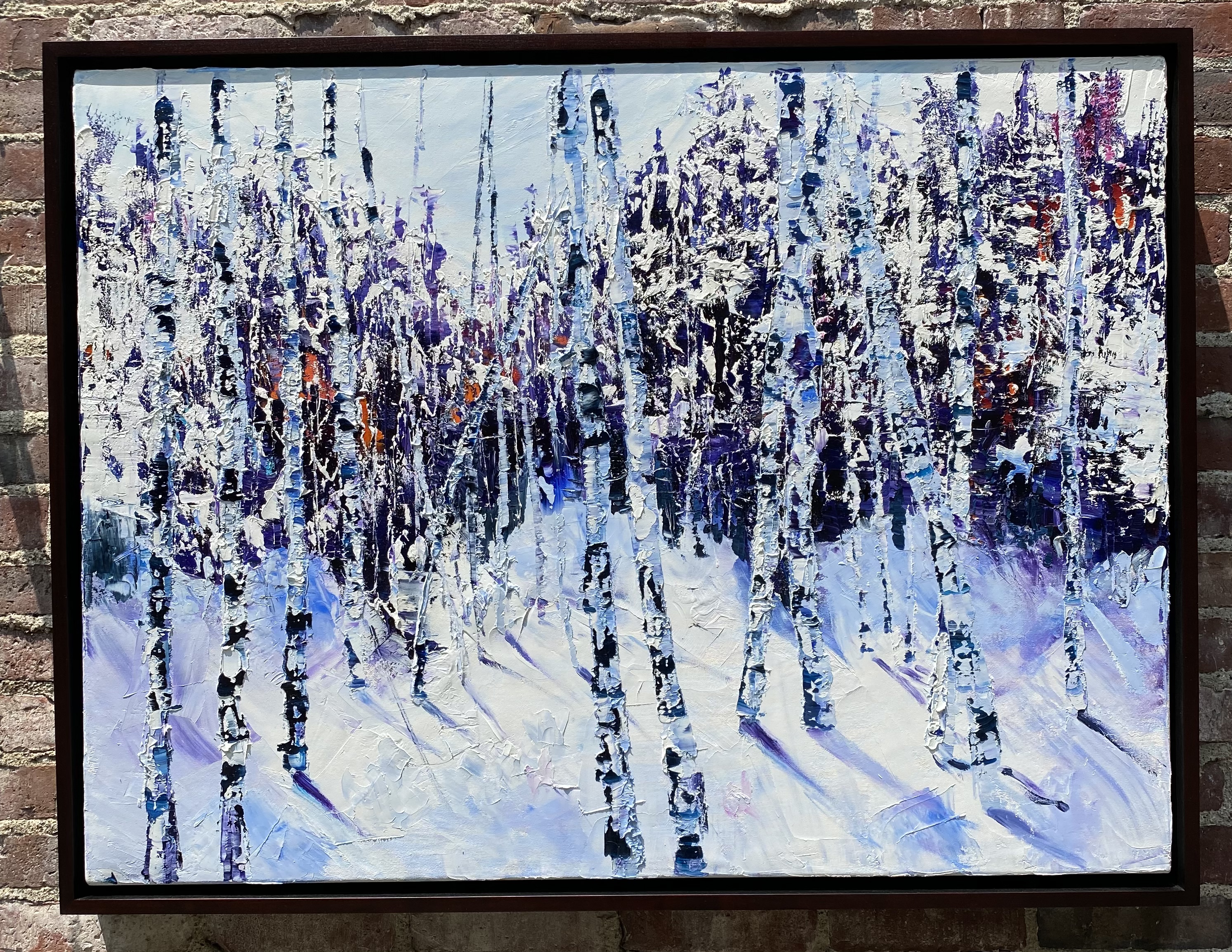
Please tell us a little bit about your childhood and your upbringing. Has art always been a part of your life or did you discover it later in life?
I'm from Cambridge, Massachusetts, which is just right outside of Boston, but it's where Harvard and MIT are. So it's just very intellectual, very international, very diverse, which is so cool. My parents were in the academics here, and so I grew up with a lot of books and a lot of curiosity about life. I was just drawn to watercolor when I was five. There were no visual artists in my immediate family. It's just not something that anyone does or cares about. They're interested in it. Everyone loves looking at art, but no one paints or sculpts, or does anything like that. So that was just in me. I was a really serious athlete for a while and a serious student. I think I ended up focusing more time and energy on sports and school because I loved it, but also because it was like a window to getting into a very good college and all these things that at the time seemed so important. Art got pushed out. I actually talk about this. I gave a big talk at Lesley University. I gave one of their artists talks a couple of years ago, but the whole thing was about my journey.
It's called Every Layer Matters. It's basically about why I went to law school having absolutely no desire to be a lawyer, but it was just like, I knew I could get into a good school and that would be a good job. And one of the things I wanted to communicate to younger people is really thinking about what they want to do in their life because so often we think about how much money we'll make or what the title seems like. But actually, the day-to-day would make us miserable. And we only have one life. So to the extent, you could figure out some job where you can earn a livable wage, but it really makes you happy. That's the dream for so many people. I just did not think about what would make me happy. I didn't even think about, did I want to be inside, or outside, with flexible work hours, or nonflexible work hours? Did I want to have a boss structure or be my own boss? Did I want to be in front of a screen? Did I want reading to be a part of it? Things that we don't even think about are the mechanics of what would make us happy with our jobs.
I didn't think about it. I was working in a corporate law firm in New York and was not happy, and I was still watercoloring on the side in my 20s. I was still doing people's wedding invitations and engagements and never thinking that it was something I was particularly gifted at. Or even though people were literally asking me and some people offered to pay me to do little things. And then about 10 years ago, I have two brothers and they've always been very supportive of me. And one of them gave me an oil painting for Christmas. And he just said I think you're really gifted as a watercolorist and you should try the oil. And I did. And other people supported me. And a lot of close friends purchased my first paintings, which were all garbage, to be honest.
But I think they showed maybe a gift for color and texture, even if compositional you'd be like, Oh, my God. Those trees are just garbage, really, truly. But there was something there. Do you know what I mean? There was just something where I intuitively understood certain things. And I just did it for a while. And I didn't have kids and I was single and all my friends were getting married and having the perfect wedding and the perfect child. And I was feeling very sorry for myself and depressed and I just dove into figuring out how to paint. And so, again, all these things in our life that we think we regret. I wish I'd met some wonderful men and had a family with them. You know what? It's fine. Everything's fine. Everything happened how it was meant to happen. I wish I had known that when I was 30, I would have saved myself a lot of anguish.
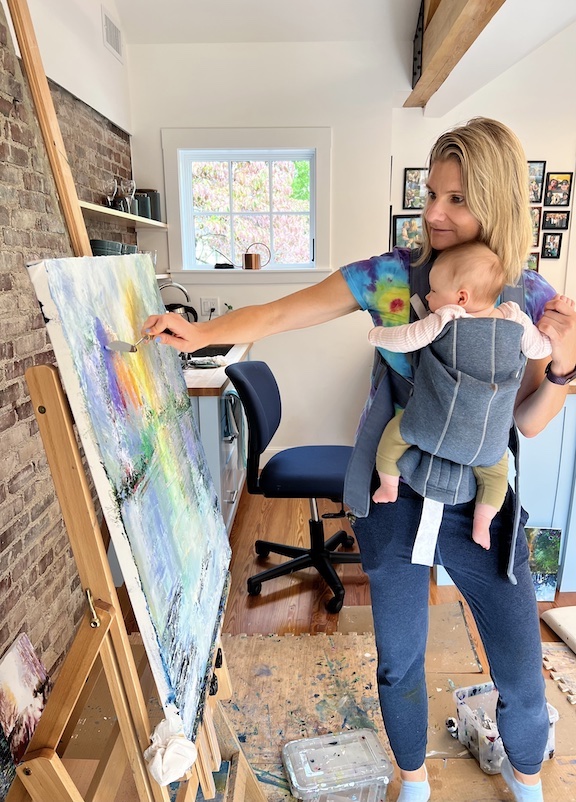
Your artwork not only enriches people's lives and homes but also supports good causes. You donate a part of your proceeds to National Resources. Can you tell us more about their mission and what originally drew you to them in particular?
I call them NRDC anyway. I was drawn to them because, well, they're lawyers and I have a legal background and I think lawyers get a bad rap. Everyone's punching back. But lawyers, actually, the good ones do incredible things to protect consumers, protect the environment, protect workers, protect children, protect women, protect people of color. It's lawyers trying to do those things. I have always been interested in the environment and protecting the environment. And this is basically a group, it's a nonprofit that litigates to protect the Earth. So if there's, I don't know, water that is damaging some water supply, like if they started a pollutant or chemical that's damaging their water supply and there are people who might be impacted or the environment might be impacted, they will sue in order to try to protect that space. And they do it in tons of different ways. And pesticides and pollutants and anything that injures the environment and therefore injures humans, to be honest, they're at the forefront of that. I wanted to support them. There are so many causes that I support. And I often throughout the year will just do a print pledge where the profits of selling prints for that week, 100 % of them, I will just donate.
So as you were not shocked by probably the earthquakes in Turkey and Syria, what's great is I reached out to my followers, I basically ask them, what are some charities that you think really are giving aid to the people on the ground. And there's always someone responding from Turkey or from Syria or their brothers there, something like that. And I always get a lot of good information. So the NRDC is a consistent monthly donation. In addition to that, I always try to do whatever's happening. I don't know how political your magazine was, but I'm very pro-choice. And when everything was happening with Roe, I started supporting certain things. The one thing I'll say is I never support political candidates just because I think that just can get pretty dicey. But I'm center-left. I'm not far left, but I'm center-left. And there are a lot of things that need our support, like the environment and women's rights, and police violence against people. There are so many things.Whatever it is happening, or if there's an earthquake or something that happens in the United States or whatever, I'll try to support that cause temporarily, which is great. No one ever was that sad, I think.
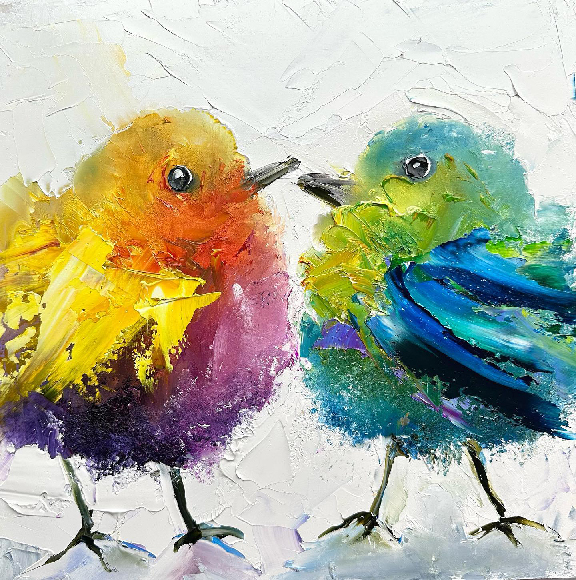
So what is next? What are your plans for the future? Do you have any shows planned or any new series that you're working on?
So the beginning of... I always think of what's next for me, which often starts in September. It's like when I start, it's weird. I like operating on an academic schedule. So right now, I'm... What am I doing? There are a couple of things like that. I'm working with a female-run puzzle company, and I think jigsaw puzzles are awesome. And we're just getting a couple of my pieces out in time for Mother's Day. Those sorts of things that, again, ways of making my art more accessible, which there's always a tension there because as I said, I also want to get my work into fancy shows or get it into fancy art fairs. And if your work is very accessible, sometimes that takes a hit to your work. So it's always something that I'm struggling with. But I got these puzzles coming out. And then I just finished a solo show in October. I don't have any shows. Usually, there's one once a year or so. I think we're also recovering from COVID. I just finished that and hopefully, there'll be more partnerships in the future. I used to work with four galleries and I still have good relationships with them, particularly one in Boston. I parted very implicitly. I just got galleries, as you probably know, take 50 %.
I was selling so well on Instagram. My reach on Instagram was so crazy. So I could sell internationally and I could sell to Canadians and all these people who wouldn't necessarily see my work in a small Boston gallery or San Diego gallery or whatever. So the upside of that is that financially, it's been a great move for my family and more and more of my work is getting into people's homes. And the downside is that I'm not in as many shows. And so that's just something that I'm thinking about and thinking about ways of trying to connect with more people to try to do more shows. And in terms of the series, I'm in a crazy river phase right now, super into rivers and trying to figure out water, which is like my endless search for water, how to paint it in the most abstract and least abstract way. So I and I've always got a couple of commissions going, so I've got a couple of fun commissions happening. And that's... We're in a good, smooth thing right now. I wouldn't say there's anything big right now on the horizon, but it's only Spring. We'll see.
|
|

